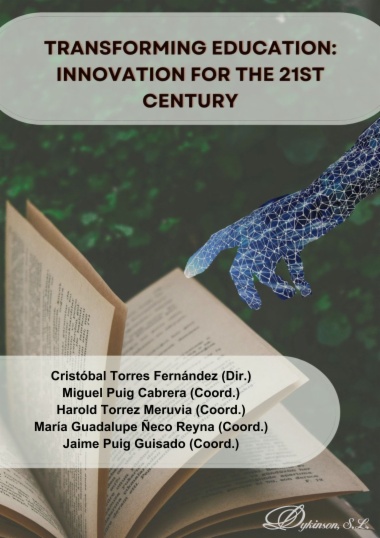The volume is structured into eleven chapters that delve into themes related to educational transformation. It showcases results from the Digitateen project, which focuses on analyzing the digital competencies of students in Seville and presents proposals such as learning landscapes. Applications of interactive methods are also among the topics covered in its sections. Special attention is given to the ethical and pedagogical challenges posed by the use of artificial intelligence in the teaching-learning process. Additionally, studies are analyzed on predictive factors influencing educators’ use of educational technologies. Significant proposals, such as tools for personalized teaching through intelligent environments, are also addressed with care in this work. This book not only provides tools and educational strategies but also invites reflection on the necessary balance between technical skills and pedagogical ethics, and the critical and conscious participation amid a technological revolution. It is a valuable resource for every educator. Regarding the integration of technologies, much remains to be studied and transformed through innovation. This volume serves as a guide for educators’ methodological approaches in their interactions with students, offering results that can be multiplied in education with a degree of creativity.
- Cover
- Copyright page
- Index of contents
- Prologue
- Chapter 1. Digitateen Project: study about digital competencies of 4th-Year ESO and 1st-Year Baccalaureate Students at IES "Velázquez" (Seville) and IES "V Centenario" (Seville)
- Chapter 2. Integrating Digital Humanities through “Learning Landscapes” for the Development of Digital Competence in Initial Teacher Training for Secondary Education
- Chapter 3. The ethical implications of the use of AI and ChatGPT in educational institutions in the European Union
- Chapter 4. Perceptions and predictive factors about Educational Technology in primary and secondary teachers in Spain
- Chapter 5. Transforming Education in the 21st Century: Educational Innovation in the Socio-Emotional Domain
- Chapter 6. The academic, experiential, and transmedia journey in the context of tangible and intangible heritage
- Chapter 7. Storytelling in Higher Education
- Chapter 8. The pedagogical diary as an innovative tool in the systematisation of the teaching practise
- Chapter 9. The impact of role-playing in speaking skills of English as a Foreign Language
- Chapter 10. Educating from the family on Personal Self-Care for violence prevention in educational institutions
- Chapter 11. The TOEIC Test as an Innovative tool for Learning English as a Second Language
- Biographical Notes of the Book Coordinators

